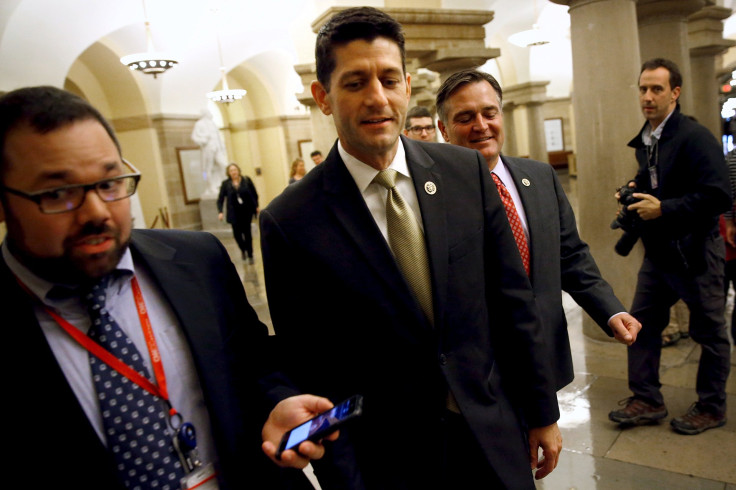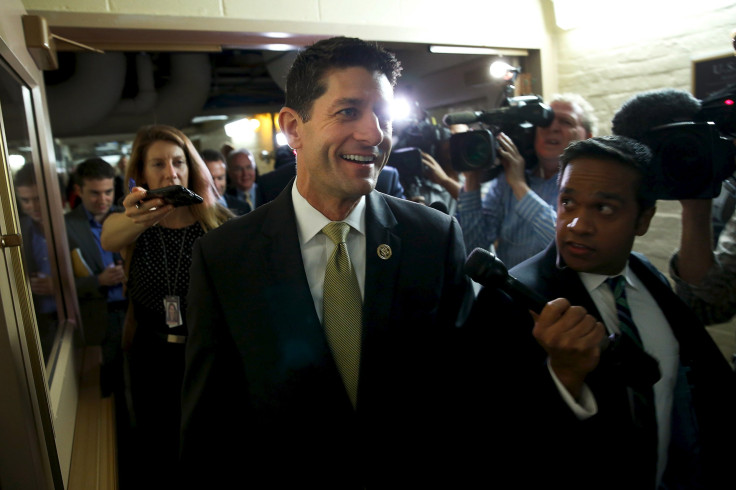House Speaker Paul Ryan? Investment, Insurance, and Oil And Gas industries Could All Benefit From That Title

As House Republicans arrived at work Wednesday, some expressed skepticism that Rep. Paul Ryan, R-Wis., could find the level of unity he said he required before he would run to become speaker of the House of Representatives. The nine-term congressman made the demand for unity just the night before, speaking to perhaps one of the most difficult groups in which to find that cohesion -- one that has already pulled down the current leader and scared away the most obvious potential replacement.
Ryan is being treated as one of the last good hopes to bridge the divide between the more traditional, establishment Republicans and the roughly 40 ultra-conservative Republicans in the House of Representatives that have leveraged their small numbers to great effect over the past five years. Should the 45-year-old Ryan run to become speaker, big money interests that have given to his prior campaigns -- and likely hope to shape issues as they relate to healthcare, the energy sector and the financial industry -- could find themselves with an important ally.
As the chairman of the House Ways and Means Committee, a position that wields incredible power over American tax policy, Ryan has attracted a great deal of money to his campaign fundraising rosters and drawn significant funds since Republicans took control of the House in 2010, when he assumed his first chairmanship at the Budget Committee. He also raised $13.1 million in 2014 between his campaign committee and leadership PAC, a personal record and making him the second-biggest fundraiser in the House that cycle, behind Speaker John Boehner.
Already having such a powerful position, he has made friends with major industries in the Washington, D.C., campaign finance game. At the top of his campaign committee industry donors are the investment, insurance, and oil and gas industries, according to data from the Center for Responsive Politics. A Ryan speakership would mean that, at the very least, those industries could have the ear of one of the most powerful people in the country, one who makes major decisions about what bills are considered in the House.
The investment industry, which gave Ryan $886,728 in 2014 and was his top donor, spent nearly $100 million last year lobbying the federal government. Employees and PACs associated with Northwestern Mutual, a financial services organization, gave Ryan $109,840 in 2014, making the company his top donor. Northwestern Mutual, and the investment industry as a whole, lobbies heavily against Wall Street regulations associated with the Dodd-Frank Wall Street Reform bill that was passed to reign in the industry after the 2008 financial meltdown. That previous activity could prompt expectations for Ryan to effectively halt progressive efforts to reform Wall Street.
Coming in second place for Ryan's political pocketbook, the insurance industry contributed $541,828 in 2014. The industry spent $151 million on lobbying in 2014. Insurance provider Blue Cross Blue Shield, the top lobbyist in the industry and Ryan's 11th biggest donor, lobbies heavily on Medicare and childhood insurance programs, and on legislation that would remove annual fees placed on health insurance providers. Considering those donations, a Ryan speakership could mean positive treatment toward a repeal of segments of the Affordable Care Act that require insurance programs to pay back premiums based upon a ratio of costs to premiums.
The oil and gas industry, which was Ryan's third biggest base, gave him $381,849 in the last election cycle. That industry spent a combined $141 million in 2014 to lobby the federal government. Koch Industries, a company founded on oil refining, was Ryan's fourth biggest donor in 2014, and the top lobbyer from the industry. The company gave Ryan $35,650, and spent a good deal of effort on federal budget and energy legislation, including ethanol mandate elimination bills and carbon taxes. That could translate into support for Republican roll backs of Environmental Protection Agency regulations that require cuts in carbon emissions from fossil fuels.

Ryan broke out on the national stage in 2012 as GOP presidential candidate Mitt Romney's running mate. The youthful conservative from Wisconsin, known best for his economic policy ideas and love of Ayn Rand, found himself seeking the country's second highest office with the support of the emerging ultra-conservative Tea Party constituency in the House that has been blamed for -- or given credit for -- a good share of Congressional conflicts that recently forced Boehner to announce his planned resignation.
The past several weeks, though, have shown that Ryan could face a difficult battle whipping his flock into shape should he run and become speaker, no matter how much money he's able to raise. He said he never sought the contentious and difficult job, but the industries that have been paying his way to re-election all these years certainly wouldn't mind having a friend in such a high place.
© Copyright IBTimes 2025. All rights reserved.






















